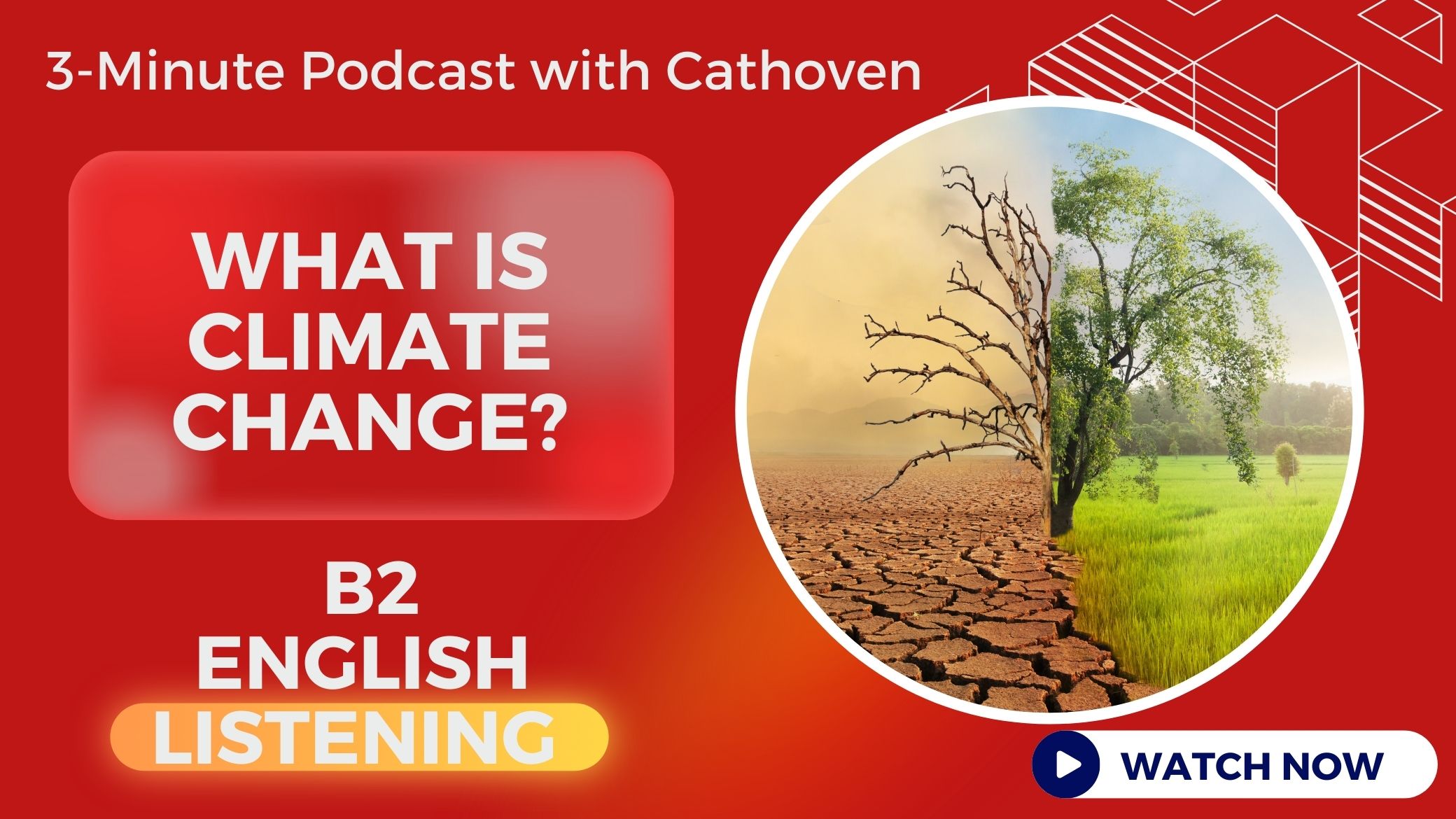What is Climate Change?
How to use this listening lesson:
- Listen to the Material
- Check the Transcript
- Solve the Questions
- Review Answer Keys and Explanations
How to use this listening lesson
- Listen to the Material
- Check the Transcript
- Solve the Questions
- Review Answer Keys and Explanations
Transcript
Transcript
Climate change refers to significant changes in global temperatures and weather patterns. While climate change is a natural phenomenon, scientific research indicates human activities accelerate these changes. For example, burning fossil fuels like coal and oil releases greenhouse gases. These gases trap heat in the atmosphere, causing global temperatures to rise. One of the most noticeable effects of climate change is the melting of polar ice caps. As ice melts, it contributes to rising sea levels. This poses a threat to coastal communities, increasing the risk of floods. Extreme weather events, such as hurricanes and droughts, are becoming more frequent and intense due to climate change. Changes in climate also affect biodiversity, impacting plants and animals. Many species are struggling to adapt to shifting environmental conditions. For instance, some animals may find it harder to find food or suitable habitats. This can lead to a decline in certain populations and even extinction in extreme cases. To combat climate change, people and governments must take significant actions. Reducing greenhouse gas emissions is critical, and this can be achieved through renewable energy sources like solar and wind power. Additionally, cutting down on waste, improving energy efficiency, and protecting forests can make a big difference. Everyone has a role to play in mitigating the impacts of climate change. By making informed choices and supporting sustainable practices, we can help safeguard the planet for future generations.
Text Analysis
This CEFR Level Card was assessed with Cathoven’s CEFR Checker.
The tool is publicly available at https://nexthub.cathoven.com/cefr?lessons.
General level: B2.4
Vocabulary level: B1.9
Verb form level: A2.0
Clause level: B1.1
Prosody level: B2.9
Phrases and Idioms
Lemma | Count | Sentences |
greenhouse gas | 2 | · For example, burning fossil fuels like coal and oil releases greenhouse gases. · Reducing greenhouse gas emissions is critical, and this can be achieved through renewable energy sources like solar and wind power. |
adapt to something | 1 | · Many species are struggling to adapt to shifting environmental conditions. |
contribute to (something) | 1 | · As ice melts, it contributes to rising sea levels. |
cut down | 1 | · Additionally, cutting down on waste, improving energy efficiency, and protecting forests can make a big difference. |
fossil fuel | 1 | · For example, burning fossil fuels like coal and oil releases greenhouse gases. |
lead to (something) | 1 | · This can lead to a decline in certain populations and even extinction in extreme cases. |
play in | 1 | · Everyone has a role to play in mitigating the impacts of climate change. |
such as | 1 | · Extreme weather events, such as hurricanes and droughts, are becoming more frequent and intense due to climate change. |
trap (someone or something) in (something) | 1 | · These gases trap heat in the atmosphere, causing global temperatures to rise. |
wind power | 1 | · Reducing greenhouse gas emissions is critical, and this can be achieved through renewable energy sources like solar and wind power. |
Listening Comprehension Exercises
True / False
- Human activities contribute to the acceleration of climate change.
- Burning fossil fuels helps in reducing greenhouse gases in the atmosphere.
- Melting polar ice caps contribute to rising sea levels.
- Climate change has no effect on biodiversity.
- Switching to renewable energy sources can help reduce greenhouse gas emissions.
It's Your Turn!
Create your multiple choice questions for this listening lesson just in seconds!
Step 1: Click the button to copy the YouTube link
Step 2: Go to
Step 3: Paste the link
Select question type
Click “Create” and your questions will be ready in seconds!
Short Answer Questions
- What major effect does the melting of polar ice caps have on the environment?
- How does burning fossil fuels contribute to climate change?
- Why are extreme weather events becoming more frequent and intense?
- What impact does climate change have on biodiversity?
- What actions can people and governments take to combat climate change?
Answer Key
True / False Answers
- Answer: True
Explanation: The text explicitly states that human activities are accelerating climate change.
Answer location: “While climate change is a natural phenomenon, scientific research indicates human activities accelerate these changes.”
- Answer: False
Explanation: Burning fossil fuels releases greenhouse gases, which increase atmospheric heat and global temperatures, rather than reducing them.
Answer location: “For example, burning fossil fuels like coal and oil releases greenhouse gases. These gases trap heat in the atmosphere, causing global temperatures to rise.”
- Answer: True
Explanation: The melting of polar ice caps is directly linked to rising sea levels as described in the text.
Answer location: “One of the most noticeable effects of climate change is the melting of polar ice caps. As ice melts, it contributes to rising sea levels.”
- Answer: False
Explanation: The text mentions that climate change affects biodiversity and many species are struggling to adapt.
Answer location: “Changes in climate also affect biodiversity, impacting plants and animals. Many species are struggling to adapt to shifting environmental conditions.”
- Answer: True
Explanation: The text states that using renewable energy sources is crucial in reducing greenhouse gas emissions.
Answer location: “Reducing greenhouse gas emissions is critical, and this can be achieved through renewable energy sources like solar and wind power.”
It's Your Turn!
Create your multiple choice questions for this listening lesson just in seconds!
Step 1: Click the button to copy the YouTube link
Step 2: Go to
Step 3: Paste the link
Select question type
Click “Create” and your questions will be ready in seconds!
Short Answer Answers
- Answer: Rising sea levels.
Explanation: The text states that the melting of polar ice caps contributes to rising sea levels.
Answer location: “As ice melts, it contributes to rising sea levels.”
- Answer: Releases greenhouse gases.
Explanation: Burning fossil fuels releases greenhouse gases, which trap heat in the atmosphere.
Answer location: “For example, burning fossil fuels like coal and oil releases greenhouse gases.”
- Answer: Due to climate change.
Explanation: The text mentions that climate change is making extreme weather events more frequent and intense.
Answer location: “Extreme weather events, such as hurricanes and droughts, are becoming more frequent and intense due to climate change.”
- Answer: Impacting plants and animals.
Explanation: Climate change affects plants and animals, making it harder for some species to adapt.
Answer location: “Changes in climate also affect biodiversity, impacting plants and animals.”
- Answer: Reducing greenhouse gas emissions.
Explanation: The text suggests reducing greenhouse gas emissions as a critical action to combat climate change.
Answer location: “To combat climate change, people and governments must take significant actions. Reducing greenhouse gas emissions is critical.”



